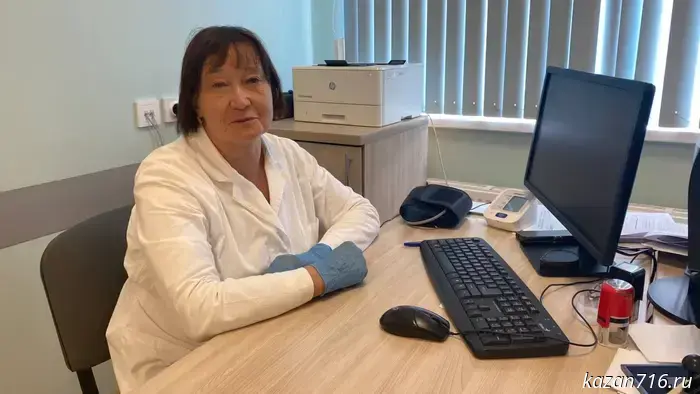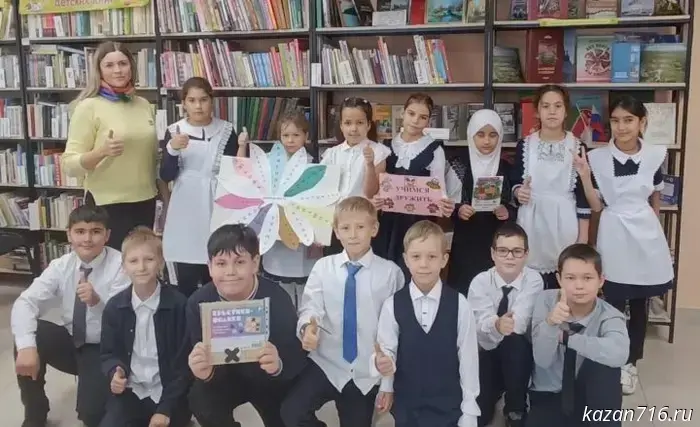
A doctor from the Vysokogorsk Central District Hospital explained why you shouldn’t self-prescribe antibiotics.
Today we will talk about a very important topic that concerns the health of each of us and our loved ones. We will be discussing antibiotics. We have all taken them at least once in our lives, and many of us have probably thought: “Last time, with the same symptoms, the doctor prescribed an antibiotic and it helped me. Why not buy the same one now and treat myself?” The physician in the medical prevention office of Vysokogorsk Central District Hospital, Rimma Karimova, states: self-prescribing antibiotics is a huge risk that can lead to serious consequences. Let’s look into why this is so dangerous.
1. Antibiotics work only on bacteria. They are useless against viruses. Bacteria are living single-celled microorganisms that can cause tonsillitis, pneumonia, pyelonephritis, cystitis and many other infections. Viruses are acellular agents that cause acute respiratory viral infections (ARVI), influenza, COVID-19, chickenpox, herpes and about 90% of all “colds.” If you take an antibiotic for a viral infection, you: do not treat the disease itself — an antibiotic has no effect on a virus; harm your body — the drug will destroy not only “bad” but also “good” bacteria that live in our gut, on the skin and mucous membranes and support our immunity; waste time and money — the illness will progress and you will not receive the proper treatment.
2. An antibiotic is not a “strong” fever medicine. It is a specialized weapon. Many people think: “I took an antibiotic and the fever went down, so it helped.” This is a misconception. Fever, cough, runny nose — these are symptoms. They can be caused by both viruses and bacteria. Fever can be reduced with paracetamol or ibuprofen. An antibiotic should eliminate the cause of the illness — a specific bacterium. Only a doctor can choose the correct antibiotic based on their knowledge and sometimes on test results.
3. Different antibiotics act on different bacteria. It’s like a key for a lock. Imagine you have a key ring. One key opens your apartment, another your car, a third the safe. Antibiotics are like that key ring. A doctor, like an experienced locksmith, determines by symptoms and tests which “lock” (bacterium) is broken and selects the right “key” (antibiotic). If you try to open your apartment door with the safe key, nothing will work. The same goes for antibiotics: a randomly chosen one simply won’t be effective.
4. The most frightening threat: antibiotic resistance (bacterial resistance). This is the most serious reason why self-treatment with antibiotics is dangerous for all humanity. What is it? When we take an antibiotic, it kills most bacteria. But the strongest and craftiest may survive. They mutate and pass on resistance to their “descendants.” Next time, that antibiotic will no longer work against those bacteria. What are the consequences? For you personally: you “train” the bacteria in your body to resist the antibiotic. When you actually develop a serious bacterial infection (for example, pneumonia), the standard antibiotic may not help. The illness will be more severe and prolonged, requiring more expensive and toxic drugs, and in the worst case the doctor may have nothing left to treat you with. Incorrect use (incomplete course, too small a dose) is the main accelerator of resistance development.
5. Antibiotics have side effects. By prescribing a drug for yourself, you do not take into account possible adverse effects: Dysbiosis: the antibiotic kills beneficial intestinal microflora, leading to diarrhea, abdominal pain and bloating. Allergic reactions: from rashes to angioedema (Quincke’s edema) and anaphylactic shock, which are life-threatening. Toxic effects on the liver and kidneys. Fungal infections (e.g., thrush), since bacteria that kept fungi in check are destroyed. A doctor is aware of these risks, takes your chronic conditions into account and can prescribe concomitant therapy (for example, probiotics).
So what should you do if you get sick? See a doctor. Only a specialist can make the correct diagnosis and determine whether you need an antibiotic. If the doctor prescribes an antibiotic, follow the instructions strictly: Observe the dose (no more and no less). Observe the dosing schedule (every 8, 12 or 24 hours). Complete the full course of treatment, even if you feel better on days 2–3! An untreated infection can return with renewed force. Never use “leftover” antibiotics from last time. Do not give your antibiotic to relatives or friends, even if they have similar symptoms. They may need a completely different drug. Antibiotics are one of medicine’s greatest achievements, having saved millions of lives. But they are a powerful weapon that requires proper handling.
More news about the event:
The doctor from Vysokogorsk Central District Hospital explained why you should not prescribe antibiotics to yourself
Today we will talk about a very important topic that concerns the health of each of us and our loved ones. 14:36 19.11.2025 Ministry of Health of the Republic of Tatarstan - Kazan
Regional news on the topic:
Antimicrobial resistance — a global threat!
Antibiotics may soon stop working — and we are to blame. Due to excessive and improper use, bacteria are becoming resistant. 16:53 19.11.2025 Social Protection Center - Lipetsk
“World Antimicrobial Awareness Week”
Every year from November 18 to 24, on the initiative of the World Health Organization (WHO), World Antimicrobial Awareness Week is observed. 16:47 19.11.2025 Rospotrebnadzor - Maykop
From November 17 to 23, 2025, a week of action against antimicrobial resistance (in honor of World Antimicrobial Awareness Week)
From November 17 to 23, 2025, a week of action against antimicrobial resistance (in honor of World Antimicrobial Awareness Week). 16:43 19.11.2025 Committee for Architecture and Urban Planning - Tula
Methods of combating antimicrobial resistance were discussed at a conference in Kaluga
They talked about the resistance of viruses and bacteria to antibiotics and the difficulties this creates in disease treatment at the Kaluga Regional Clinical Hospital. 16:34 19.11.2025 GTRK Kaluga - Kaluga
A week of action against antimicrobial resistance is held in Russia from November 17 to 23, 2025
Antimicrobial resistance is the ability of microorganisms such as bacteria, viruses, parasites and fungi to resist the action of antimicrobial drugs such as antibiotics. 16:17 19.11.2025 Clinical Diagnostic Center - Izhevsk
Medical specialists in our region are participating in the nationwide week of action against antimicrobial resistance
Why do bacteria become insensitive to antibiotics, and how do you select drugs to treat serious illnesses? 16:11 19.11.2025 TRK Gubernia-33 - Vladimir
Antibiotics: rules for use and risks of uncontrolled use
Antibiotics are prescription drugs used to fight bacterial infections. 16:07 19.11.2025 RuzaRIA - Ruza
A gastroenterologist at the V.D. Seredavin Hospital named the rules for taking antibiotics
The chief freelance gastroenterologist of the Ministry of Health of the Samara Region, head of the gastroenterology department (Samara Regional Clinical Hospital named after V.D. Seredavin). 16:03 19.11.2025 NIA Samara - Samara
Week of action against antimicrobial resistance
When fighting a cold or the flu, when it seems nothing helps, many start using antibiotics. 15:37 19.11.2025 Tula Regional Philharmonic - Tula
Week of action against antimicrobial resistance (in honor of World Antimicrobial Awareness Week) from November 17 to 23, 2025
When fighting a cold or the flu, when it seems nothing helps, many start using antibiotics. 14:59 19.11.2025 Ministry of Property and Land Relations - Tula
Expert: “Timely vaccination against infectious diseases reduces the need to use antibiotics”
Lyudmila Slepneva, chief freelance specialist of the Ministry of Health of the Samara Region for medical prevention in the Samara urban district. 14:48 19.11.2025 Gazeta Selsky Trudnik - Bezenchuk
Expert: “Viral illnesses, including ARVI and influenza, do not require antibacterial therapy”
The chief freelance pediatric specialist in preventive medicine of the Ministry of Health of the Samara Region, head of the pediatric clinic. 14:48 19.11.2025 Gazeta Selsky Trudnik - Bezenchuk
Are antibiotics needed for treating ARVI?
Share:
This question arises for many, especially during the seasonal rise in illness. 20:43 19.11.2025 IA Tayshet24 - Tayshet
Rules for taking antibiotics: how to prevent complications and increase treatment effectiveness
Antibiotics are powerful drugs capable of treating infections, but incorrect use can lead to undesirable consequences. 16:33 19.11.2025 GAUZ RVFD - Ufa
How dangerous is uncontrolled antibiotic use?
This is discussed by the chief freelance specialist of the Ministry of Health of the Samara Region in therapy, head of the Department of Faculty Therapy of SamSMU, Oleg Fatenkov. 14:21 19.11.2025 Gazeta Step - Pestravka
A week of action against antimicrobial resistance is underway
Microorganism resistance to antibiotics is a serious and complex problem that affects every person. 16:12 19.11.2025 Buguruslan District - Buguruslan
Week of action against antimicrobial resistance in Russia
The Ministry of Health of the Russian Federation has declared the week from November 17 to 23, 2025, a Week of Action against Antimicrobial Resistance (in honor of World Antimicrobial Awareness Week). 13:42 19.11.2025 Veterinary Department - Leningrad Region
What is the harm of antibiotics? A pharmacologist explains
Antibiotics are effective only against bacteria, while acute respiratory viral infections are caused by viruses and require a different approach. 17:30 19.11.2025 Om1.Ru - Omsk
What is antibiotic resistance?
Resistance to antimicrobial drugs has become one of the most acute problems of our time, posing biological and economic threats to all countries. 13:28 19.11.2025 Civil Registry Committee - Ivanovo
Другие Новости Казани (Казань716)
 Fitness trainer Litovchenko explained how to stretch properly.
Stretching helps muscles recover, but it should only be done after warming up. November 19, 2025. Tatar-Inform News Agency. Republic of Tatarstan. Kazan.
Tatarstan ranked among the top three regions in the Russian Federation in terms of procurement from SMEs.
Tatarstan ranked third among Russian regions by the volume of purchases from small and medium-sized enterprises. November 19, 2025. Tatar-Inform News Agency. Republic of Tatarstan. Kazan.
Fitness trainer Litovchenko explained how to stretch properly.
Stretching helps muscles recover, but it should only be done after warming up. November 19, 2025. Tatar-Inform News Agency. Republic of Tatarstan. Kazan.
Tatarstan ranked among the top three regions in the Russian Federation in terms of procurement from SMEs.
Tatarstan ranked third among Russian regions by the volume of purchases from small and medium-sized enterprises. November 19, 2025. Tatar-Inform News Agency. Republic of Tatarstan. Kazan.
 Air masses from the Atlantic warmed by the Gulf Stream: a climatologist explained the abnormal warmth in Tatarstan.
Climatologist Timur Aukhadeev, in an interview with the editorial staff of the Tatarstan 24 website, explained the anomalous warmth that had settled in the Republic of Tatarstan in the final month of autumn. 19.11.2025. TV and Radio Company Tatarstan‑New Century. Republic of Tatarstan. Kazan.
The Ministry of Land and Property of the Republic of Tatarstan has launched an internship program for municipal officials in property and land resource management.
On November 19, a two-day internship on the topic "Organization of Management of Property and Land Resources" opened at the Ministry of Land and Property Relations of the Republic of Tatarstan. 19.11.2025. Ministry of Land Relations. Republic of Tatarstan. Kazan.
Air masses from the Atlantic warmed by the Gulf Stream: a climatologist explained the abnormal warmth in Tatarstan.
Climatologist Timur Aukhadeev, in an interview with the editorial staff of the Tatarstan 24 website, explained the anomalous warmth that had settled in the Republic of Tatarstan in the final month of autumn. 19.11.2025. TV and Radio Company Tatarstan‑New Century. Republic of Tatarstan. Kazan.
The Ministry of Land and Property of the Republic of Tatarstan has launched an internship program for municipal officials in property and land resource management.
On November 19, a two-day internship on the topic "Organization of Management of Property and Land Resources" opened at the Ministry of Land and Property Relations of the Republic of Tatarstan. 19.11.2025. Ministry of Land Relations. Republic of Tatarstan. Kazan.
 Tatarstan's Rosreestr has registered 99 apartment buildings in the cadastre since the beginning of 2025.
The Rosreestr office in the Republic of Tatarstan reported significant achievements in housing registration. 19.11.2025. Mendeleev News. Republic of Tatarstan. Mendeleevsk.
Tatarstan's Rosreestr has registered 99 apartment buildings in the cadastre since the beginning of 2025.
The Rosreestr office in the Republic of Tatarstan reported significant achievements in housing registration. 19.11.2025. Mendeleev News. Republic of Tatarstan. Mendeleevsk.
 In Zainsk, schoolchildren were taught the basics of tolerance in a themed session at the library.
In Zainsk, at City Library No. 7, an educational hour titled "Tolerance Will Save the World" was held for third-grade students of School No. 5.
The event, conducted by librarian Elvira Arkhipova, took place on November 19, 2025. Zainsk News. Republic of Tatarstan. Zainsk.
In Zainsk, schoolchildren were taught the basics of tolerance in a themed session at the library.
In Zainsk, at City Library No. 7, an educational hour titled "Tolerance Will Save the World" was held for third-grade students of School No. 5.
The event, conducted by librarian Elvira Arkhipova, took place on November 19, 2025. Zainsk News. Republic of Tatarstan. Zainsk.
A doctor from the Vysokogorsk Central District Hospital explained why you shouldn’t self-prescribe antibiotics.
Today we will talk about a very important topic that concerns the health of each of us and our loved ones. November 19, 2025. Ministry of Health of the Republic of Tatarstan. Republic of Tatarstan. Kazan.
